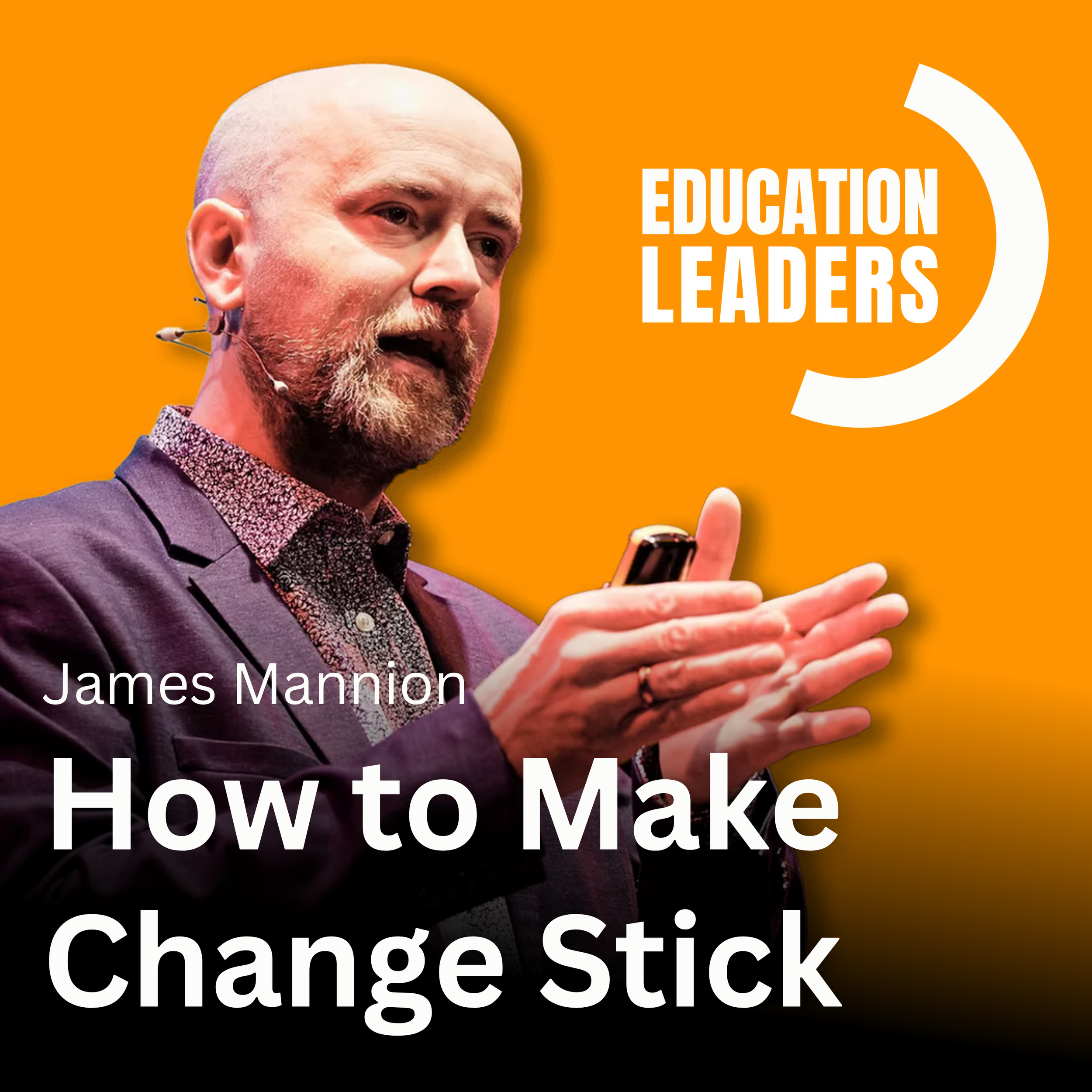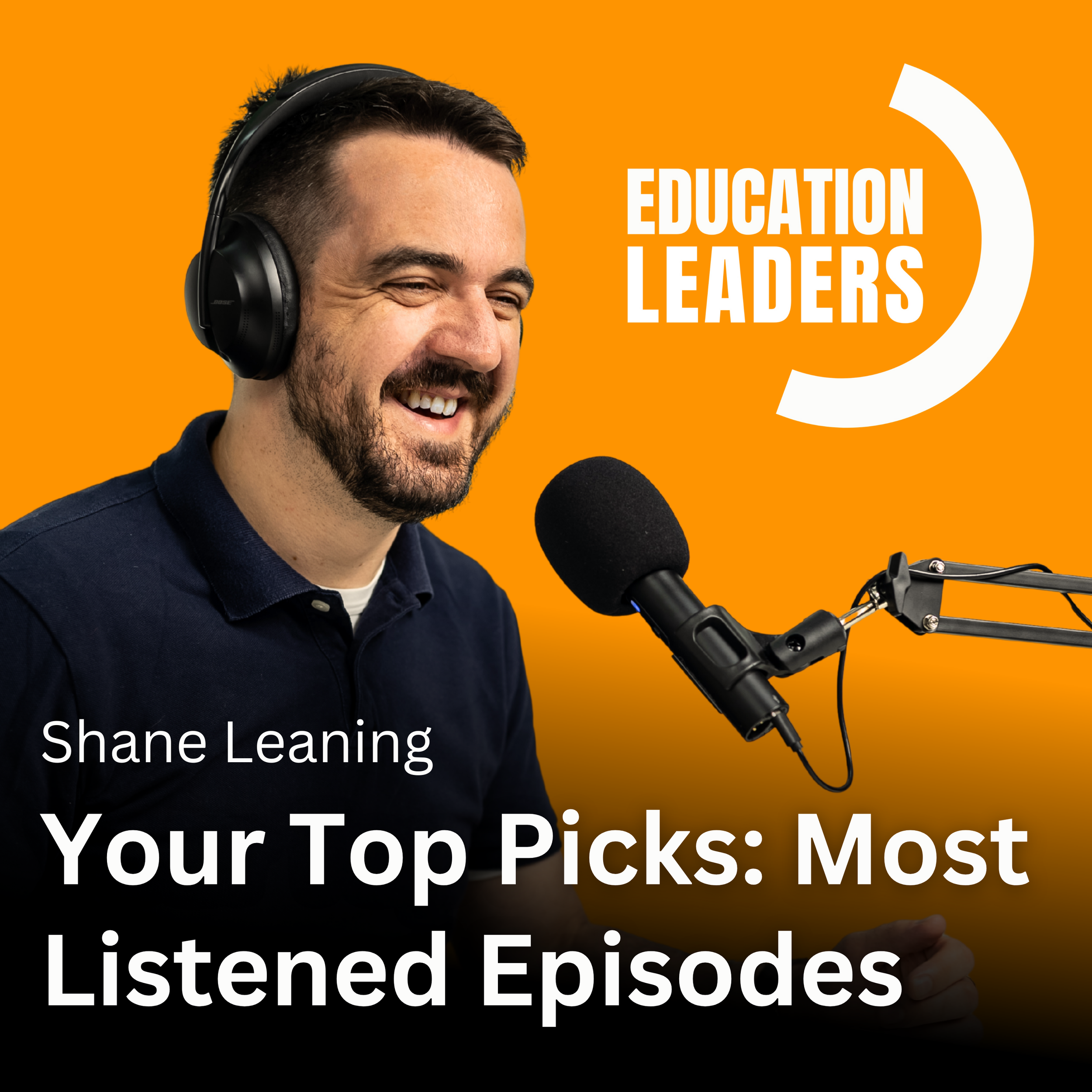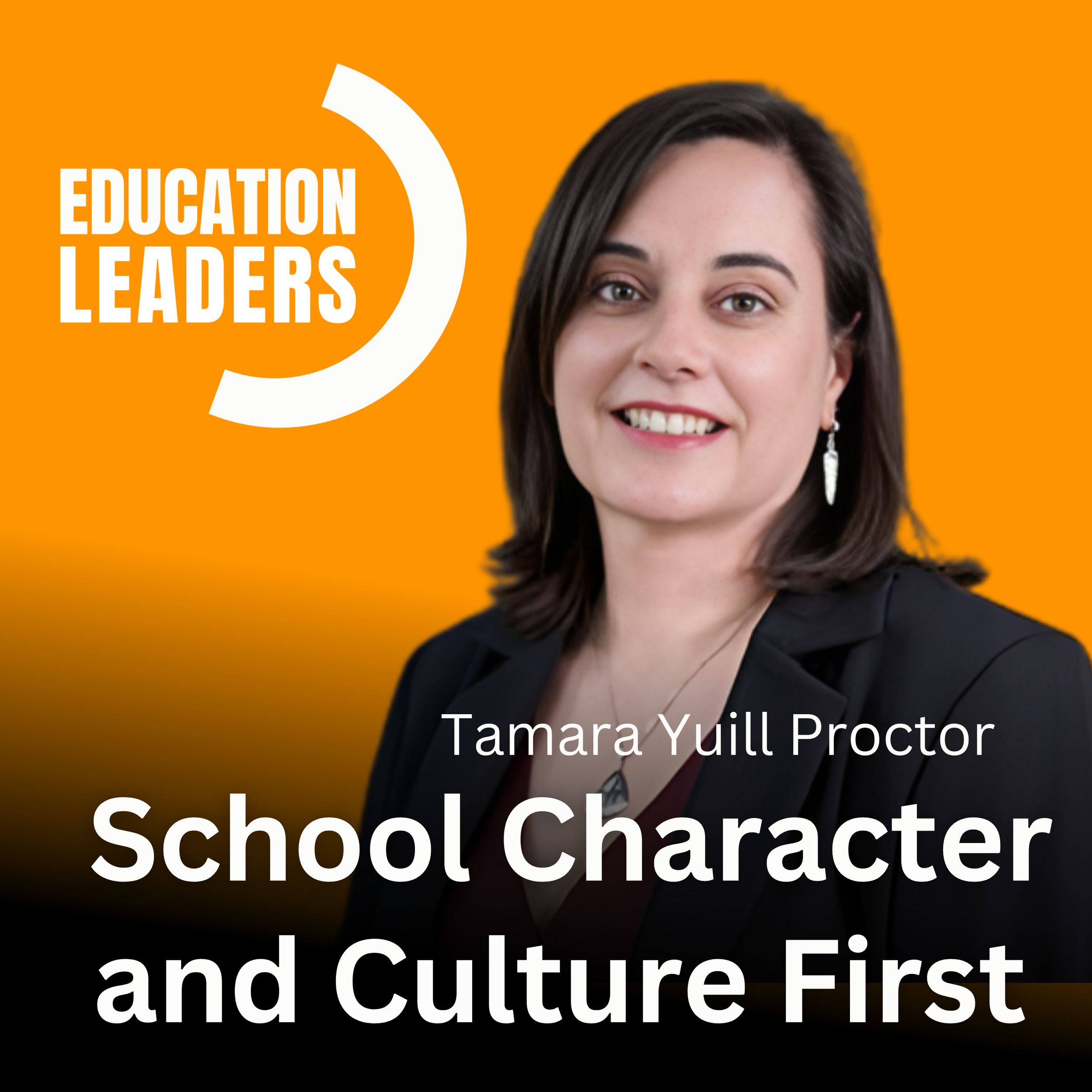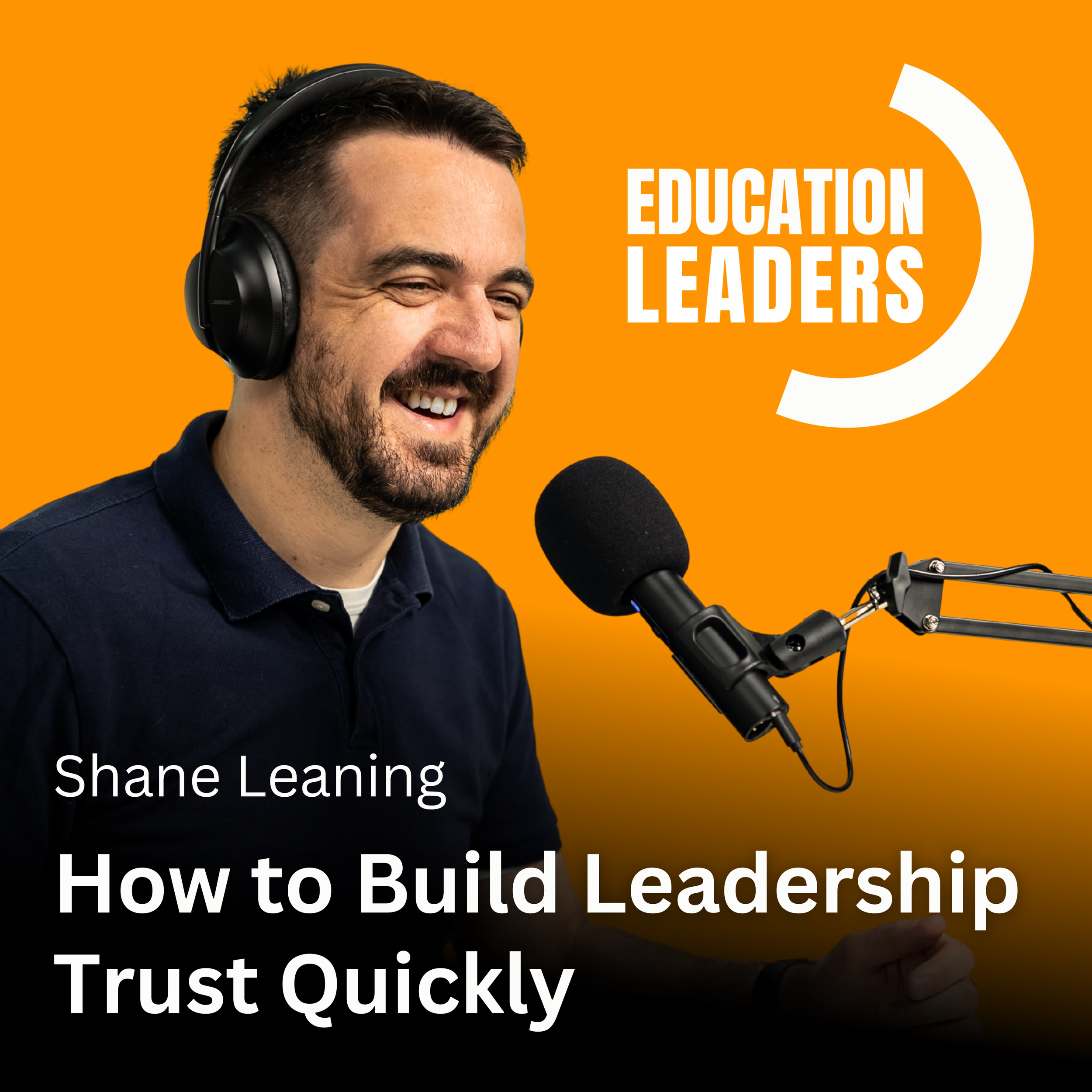Impactful interviews with renowned thought leaders and deep-dives in to school trends and strategies from around the world, to support you in your school leadership journey.
EDUCATION LEADERS has topped the School Podcast charts in countries across the world* and is in the top 5% of all podcasts globally*.
*#1 podcast in Apple Podcast Charts in Hong Kong, Ireland, April 2024, Top 5% data from ListenNotes in 2025
Tune in every week:
How to Make Change Stick
Dr James Mannion has noticed something telling when working with school leaders: ask them what proportion of change initiatives actually improved anything. Most estimate 10-20%, but when pressed about sustainable change with real evidence, that figure drops to nearly zero. Dr James Mannion, author of a comprehensive programme on implementation science, explains why this failure rate persists despite everyone knowing about it and more importantly, how schools can break the cycle. James reveals two deep-rooted issues: leaders aren't taught change management, and we default to top-down approaches that violate people's fundamental need for autonomy.
Your Top Picks: Most Listened Episodes
As 2025 comes to a close, Shane reflects on the year by counting down the five most listened to episodes of Education Leaders. The podcast has grown significantly, doubling in size just in the last six months and reaching around 150 episodes total. Whether you've been following along all year or you're brand new to the show, this episode gives you a curated guide to the conversations that resonated most with school leaders worldwide.
School Character and Culture First
When Dr. Tamara Yuill Proctor began researching curriculum integration at secondary level, she quickly discovered that successful change wasn't really about curriculum at all. It was about understanding the character and culture of the school first: the people, their capacity, the school's history, and what the community actually needs. In this conversation, Tam shares findings from her doctoral research into how schools create meaningful change, focusing on a New Zealand school that hadn't changed its timetable in 25 years yet managed to transform its approach to learning.
How to Build Leadership Trust Quickly
Which breaks faster: trust in someone's competence or trust in their character? Shane explores Stephen Covey's framework that trust operates on two separate dimensions. Competence trust builds quickly through credentials, positions, and demonstrated capability, but character trust takes time to develop through consistent honesty and integrity. The crucial insight? While competence breaks slowly with each mistake being somewhat forgivable, character trust can shatter in a single moment. Shane shares a vulnerable story from his own leadership journey about a time he broke someone's trust and the lasting impact it had on that professional relationship.
Ethical School Leadership
When Sam Gibbs asked, "Are we any further forward in honestly trusting the teaching profession?", she hit on something uncomfortable. In too many schools, we've slipped into what Sam calls toxic accountability. Sam, Director of Education at Greater Manchester Education Trust and co-author of The Trouble With English, argues that school leaders need to start from one simple assumption: teachers are professionals who want to do right by children. This conversation gets into why we've become unhealthily dependent on external products, how to use evidence without ignoring what teachers know works in their classrooms, and why that matters for actually changing practice.
How to Think Long-Term When Everything's on Fire
When Sam Gibbs asked, "Are we any further forward in honestly trusting the teaching profession?", she hit on something uncomfortable. In too many schools, we've slipped into what Sam calls toxic accountability. Sam, Director of Education at Greater Manchester Education Trust and co-author of The Trouble With English, argues that school leaders need to start from one simple assumption: teachers are professionals who want to do right by children. This conversation gets into why we've become unhealthily dependent on external products, how to use evidence without ignoring what teachers know works in their classrooms, and why that matters for actually changing practice.
How to Trust Your Teachers
When Sam Gibbs asked, "Are we any further forward in honestly trusting the teaching profession?", she hit on something uncomfortable. In too many schools, we've slipped into what Sam calls toxic accountability. Sam, Director of Education at Greater Manchester Education Trust and co-author of The Trouble With English, argues that school leaders need to start from one simple assumption: teachers are professionals who want to do right by children. This conversation gets into why we've become unhealthily dependent on external products, how to use evidence without ignoring what teachers know works in their classrooms, and why that matters for actually changing practice.
Coaching For School Leaders
When someone says “have you got a moment?” your instinct might be to say yes — and then lose 20 minutes, your focus and whatever calm you had left. This solo episode shows you a practical, repeatable way to handle those knocks so you protect your attention and still serve your team. Shane introduces the five-second “doorway decision”, explains how essentialist thinking underpins the approach, and shows how to set a clear 15-minute container for short conversations so they’re focused and useful.
Have You Got a Moment?
When someone says “have you got a moment?” your instinct might be to say yes — and then lose 20 minutes, your focus and whatever calm you had left. This solo episode shows you a practical, repeatable way to handle those knocks so you protect your attention and still serve your team. Shane introduces the five-second “doorway decision”, explains how essentialist thinking underpins the approach, and shows how to set a clear 15-minute container for short conversations so they’re focused and useful.
Teaching Leadership Through Curriculum
When brilliant teachers become exhausted leaders, it’s usually not because they lack ability — it’s because they’re cognitively overloaded by the basics. In this solo episode Shane explains what that overload looks like (the story of “Sarah” who dreads Monday evenings), why common leadership programmes often skip the fundamentals, and how cognitive load theory helps explain what’s going on. If you’re struggling to hold difficult conversations, run useful meetings, or make decisions without second-guessing, this episode focuses on a practical, sequenced fix rather than another strategic to-do list.
How Leaders Beat Cognitive Overload
When brilliant teachers become exhausted leaders, it’s usually not because they lack ability — it’s because they’re cognitively overloaded by the basics. In this solo episode Shane explains what that overload looks like (the story of “Sarah” who dreads Monday evenings), why common leadership programmes often skip the fundamentals, and how cognitive load theory helps explain what’s going on. If you’re struggling to hold difficult conversations, run useful meetings, or make decisions without second-guessing, this episode focuses on a practical, sequenced fix rather than another strategic to-do list.
From Formative Assessment to Formative Action
This conversation dives into what formative action is, why Valentina Devid and colleagues reframed formative assessment as an action-oriented practice, and why that reframing matters for school leaders trying to get useful classroom evidence turned into immediate, high-impact teaching moves. Valentina walks through the five-step action-oriented investigation process (orient & predict; think & generate; interpret, communicate & decide; informed follow-up; verify, reflect & predict), gives concrete classroom examples (history teachers checking the five causes of the First World War using mini whiteboards), and warns about common “mutations” — for example, when formative work is dumped into a learning management system as a grade with zero weight and loses purpose.
How to Lead Without Being Needed
What happens when you take a school leader who's used to timetables, structure, and constant visibility, and drop them into the chaos of running a startup? Brett Griffin made that exact transition, moving from assistant principal to CEO of Pupil Progress, a tech company now used by over 700 schools globally. This conversation reveals something uncomfortable: the very structures that make schools function might be stopping your leaders from doing their best work. Brett shares why 80% of a teacher's day is pre-determined before they even start, and what that means for trust, autonomy, and deep work.
Teaching Primary Children Where They Are
In this essential episode for school leaders, Shane explores primary education leadership with Emma Turner, a primary education expert with over 25 years of experience in school leadership development. Emma challenges the common practice of applying secondary-focused approaches to primary settings, sharing practical school leadership strategies that respect how young children actually learn. This conversation offers valuable education leadership training for international school leaders who want to improve their understanding of age-appropriate pedagogy and effective transition processes between educational phases.
Leading With Conviction
Katharine Birbalsingh, founder of Britain's most talked-about school, reveals the leadership principles that transformed her vision into reality. From her converted office building in London, Michaela Community School has achieved the highest progress scores in England for three consecutive years, with results that rival the country's most elite institutions.
How to Make Change Feel Safe
Shane Leaning speaks with Paul Halford about his new book "My Educated Life: Lessons from Leading Schools." Paul explores why change in schools is fundamentally a subjective experience, explaining how even the most logical strategic plans can fail when they encounter the reality of people's personal lives and emotional responses. Using a football coaching analogy from his youth, he demonstrates how successful change requires leaders who build trust, allow for honest communication about difficulties, and create safe spaces for dissent and feedback.
Change Starts Here
In this special extended conversation, Shane sits down with his co-author Efraim Lerner for an unfiltered chat about their upcoming book "Change Starts Here" and why they believe schools need to rediscover confidence in their own communities.
The Trusted Adult Effect
In this episode, I speak with David Ingram, Founding Head of College at Dulwich College Shanghai Puxi about:
How his experience as a police constable in County Durham shaped his approach to education and student wellbeing
The importance of establishing "trusted adults" for every student and how to systematically ensure this happens
Building a comprehensive wellbeing framework that addresses academic, social, emotional, mental and physical dimensions
Moving from seeing wellbeing as a "strategic priority" to a long-term "strategic commitment"
A nuanced approach to smartphones in schools that balances innovation with appropriate boundaries
How Leaders Make Ripples
My guest today is David Harkin, CEO and Founder of 8billionideas, which has impacted over 500,000 students in 26 countries. David is a two-time TEDx speaker, author of 'The Ripple Effect', and was ranked 8th globally by ISC Research for his contributions to the education sector in 2022. Before entering education, David was an IBM executive and was the youngest globally to receive their CEO award.
New Bestseller: Change Starts Here
In this special episode, Shane Leaning discusses his new best-selling book "Change Starts Here: What if Everything Your School Needed Was Right in Front of You?", co-authored with Efram Learner. Shane shares why they wrote the book, its core philosophy, and how it can help school leaders drive meaningful change by looking inward to their communities rather than constantly seeking external solutions.





















